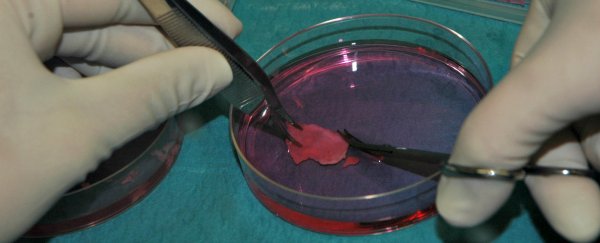A team of Belgian doctors have managed to restore fertility in a 27-year-old woman using a piece of ovarian tissue that was removed and frozen when she was 13.
This is the first time this procedure has worked with non-adult tissue, offering new hope for women who are infertile as a result of medical treatments during their childhood. The case study has been published in the journal Human Reproduction.
"This is an important breakthrough in the field because children are the patients who are most likely to benefit from the procedure in the future," said lead author, researcher and gynaecologist Isabelle Demeestere, in a press release. "When they are diagnosed with diseases that require treatment that can destroy ovarian function, freezing ovarian tissue is the only available option for preserving their fertility."
At the age of 13, the patient described in the new study underwent chemotherapy so that she could receive a bone marrow transplant from her brother, intended to treat severe sickle-cell anaemia. Bone marrow transplants typically require the suppression of the patient's immune system using chemo or radiotherapy, and this can permanently destroy the functioning of the ovaries. So doctors will often remove a healthy ovary and freeze tissue fragments for potential later use.
The patient's remaining ovary eventually failed as a result of ongoing immunosuppressant drugs. But a decade later she started looking into ways she could start a family, and a team of doctors at the Fertility Clinic and Research Laboratory on Human Reproduction at Erasme Hospital in Brussels decided to try using her frozen ovarian tissue. They thawed some of it, and grafted four fragments onto the patient's non-functioning ovary, as well as 11 fragments elsewhere in the body.
This procedure had never worked on tissue that had been frozen for so long before, and was made more complicated by the fact that the patient hadn't yet had her period when the sample was taken.
But the operation was a success - the grafted ovarian tissue responded to the woman's hormones, and began producing the little follicles needed to release maturing eggs. The patient started having regular menstrual cycles, and two years later became pregnant naturally. Last November she finally gave birth to a healthy baby boy.
The graft appears to still be working, so the woman will likely be able to have more children in the future, without any medical help. "The patient is, of course, very happy, enjoying her new life of a mother," Demeestere told the BBC. "And she was stressed during all the procedures, because it's the only option for her to have a family, so it's a real hope now for other children who go through this procedure."
This is not the first time frozen ovarian tissue has been successfully used to restore fertility, but it is the first time it has worked in someone whose ovary was frozen at such an early age. This gives hope to thousands of other patients in a similar situation.
"However, the success of this procedure requires further investigation in very young, pre-pubertal girls, as our patient had already started puberty even although she had not started menstruating," Demeestere cautions.
